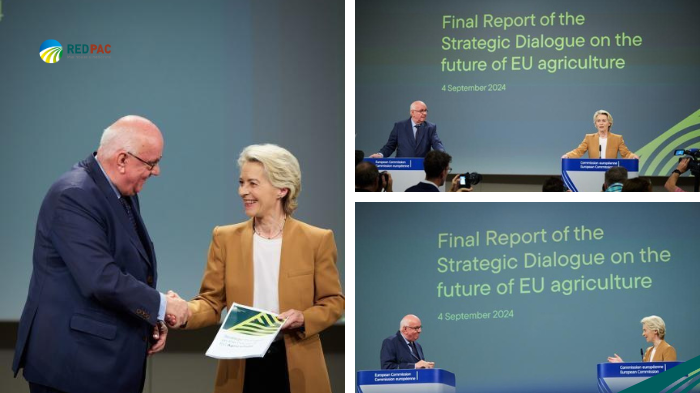
09 de September de 2024
The report, entitled "A Common Perspective on Agriculture and Food in Europe", constitutes the new starting point in the European agricultural strategy.
- The report, entitled "A Common Perspective on Agriculture and Food in Europe", constitutes the new starting point in the European agricultural strategy.
- This study will shape the new “Vision on Agriculture and Food,” which will be presented in the coming months.
- Following this report, the European Commission is considering creating a new platform that will bring together stakeholders from across the agri-food sector, civil society and the world of science to propose new strategies for more sustainable and resilient agri-food systems.
The European Commission (EC) presented on September 4, as a kick-off for the new agricultural and rural year 2024-2025, the report entitled "A common perspective on agriculture and food in Europe" , which was commissioned by the president of this entity, Ursula Von der Leyen, last January, when she opened a dialogue table among the 29 member countries of the European Union (EU) to reach a strategic consensus on the European agri-food chain.
The final report presented by this dialogue table is intended to guide the EC's work in shaping a "Vision on Food and Agriculture," which will be presented shortly. The EC is also exploring the possibility of creating a platform bringing together stakeholders from across the agri-food sector, civil society, and the scientific community to develop new strategies aimed at more sustainable and resilient agri-food systems.
The future of agriculture
Professor Peter Strohschneider was the expert in charge of supervising the report, entitled “A shared perspective on farming and food in Europe”, due to his extensive experience.
The study presents the current challenges and opportunities facing the sector, followed by a series of recommendations structured around five pillars:
- Cooperating for a sustainable, resilient and competitive future : This section addresses the need to adapt the CAP current shift towards more sustainable and competitive food systems, as well as the importance of strengthening farmers' position in the food value chain, access to finance, and the role of trade and international standards.
- Moving toward sustainable agri-food systems: This document details sustainable agricultural and livestock practices, and calls for greater awareness of animal welfare and the practice of sustainable and balanced diets.
- Building resilience: In the face of growing environmental, climate, geopolitical, and economic risks, the report highlights the need to strengthen risk and crisis management tools, preserve land and water resources, and foster innovation in this field.
- Creating an attractive and diverse sector and strengthening rural areas: This highlights the importance of generational renewal and gender equality, as well as strengthening rural areas.
- Access to knowledge and innovation: An effort is called for to facilitate access to knowledge and new tools in digitalization.
Ultimately, there is a consensus among the members of the strategic dialogue table that economic, environmental, and social sustainability within the agri-food sector can be strengthened through appropriate policy measures.
Rural protagonism
The European Network ofLEADER Groups ( ELARD ) played a key role in this roundtable discussion , as it was the only entity involved in rural development to participate in the dialogue. Through ELARD, the rural environment and its inhabitants were incorporated into this report through a series of recommendations:
- Adopting the Long-Term Vision for Rural Areas (LTVRA).
- Strengthening the role of rural areas and rural communities (download the full chapter excerpt here ).
- Implement rural proofing in light of the new Multiannual Financial Framework (MFF) - scheduled for 2025 - and encourage Member States to do the same.
- Establish a “ European rural contract ”.
- Create a complementary and temporary “Just Transition Fund” to accelerate the transition towards sustainability of the sector.
- Create a “Nature Restoration Fund” with sufficient resources (outside the CAP).











